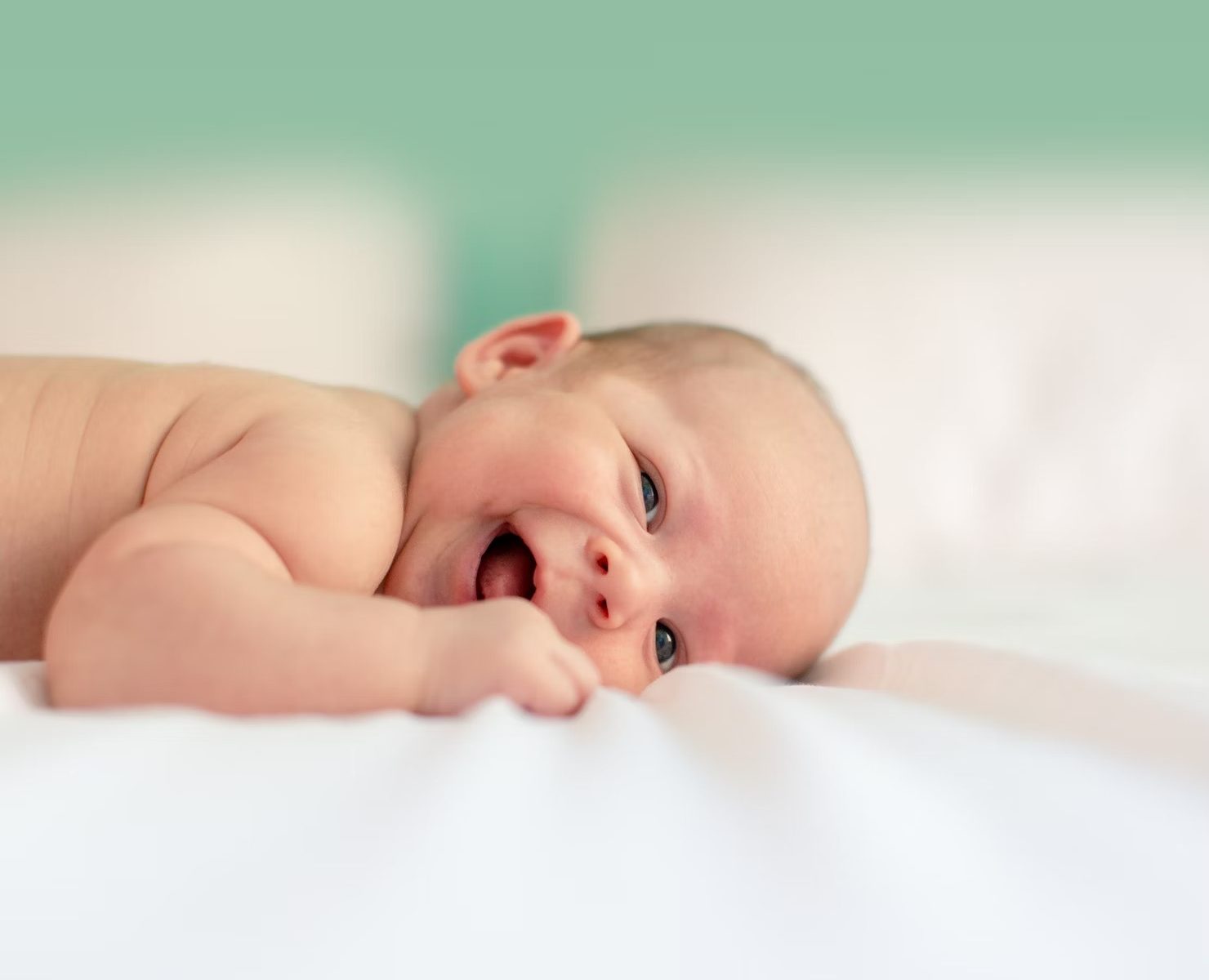Babies, those bundles of joy and curiosity, are a constant source of wonder and fascination for parents and researchers alike. One particularly enchanting phenomenon that parents often report is the sight of their babies smiling while they sleep. These fleeting, ethereal smiles have intrigued generations of parents and scientists, prompting questions about their origins and significance. Why do babies smile in their sleep, and what does it reveal about their inner world? In this exploration, we delve into the captivating world of infant sleep, dreams, and the mysterious smiles that grace their slumbering faces.
The Enigma of Baby Smiles
Before delving into the reasons behind why babies smile in their sleep, it’s crucial to understand the complexity of infant sleep itself. The sleep patterns of babies, particularly newborns, are drastically different from those of adults. Infants spend the majority of their day asleep, often drifting in and out of various sleep stages with remarkable frequency. While adults typically experience two distinct phases of sleep, namely Rapid Eye Movement (REM) and non-REM sleep, babies undergo several more.
REM sleep, characterised by rapid eye movement and increased brain activity, plays a crucial role in both dreaming and the phenomenon of baby smiles. During this stage, a baby’s brain is highly active, and it is believed to be the time when dreams occur. And it’s within these dreams that the mystery of baby smiles begins to unravel.
Dreams in the Cradle
While babies cannot narrate their dreams, researchers have gathered considerable evidence to suggest that infants do indeed dream during REM sleep, which usually takes up about 50% of their total sleep time. These dreams are thought to be abstract, emotional experiences rather than complex narratives like those of adults. Infants are unable to process and recall images or scenarios as adults do, but they can still experience emotions and sensations during REM sleep.
Baby smiles during sleep are often attributed to these dreamlike experiences. Some researchers propose that babies might be dreaming of pleasant and comforting sensations or images, which manifest as smiles on their faces. These dreams could be as simple as the feeling of being cradled in their parent’s arms, the warmth of being breastfed, or the soothing sensation of gentle rocking.
Learning and Processing
Another possible explanation for baby smiles in their sleep revolves around the idea of learning and memory consolidation. Babies are constantly absorbing information from their surroundings and experiences. The brain is highly active during REM sleep, and some experts suggest that this stage helps consolidate the information they have gathered throughout the day.
When babies encounter pleasurable or comforting experiences, such as the touch of their parents, the sound of their voices, or the taste of their mother’s milk, these sensations may get replayed in their dreams. Smiles during sleep could be a reflection of the brain’s effort to process these pleasant experiences, reinforcing them as positive memories.
Expressing Needs and Emotions
As adults, we often associate smiles with happiness or contentment. However, babies’ smiles during sleep might not necessarily be connected to feelings of joy. Infants use smiles as a form of communication, and this extends to their sleep state. When babies smile during sleep, it can also be a way for them to express their needs or emotions.
For instance, a baby might be dreaming about hunger, discomfort, or a need for warmth. The smile could serve as a reflexive response to these sensations, much like how they cry when they are awake to signal their needs. It’s essential for parents to pay attention to these smiles, as they can provide valuable insights into their baby’s state of well-being and help caregivers respond appropriately.
Evolving Smiles
The phenomenon of babies smiling in their sleep is not confined to the first few weeks or months of life. As babies grow and develop, so do their smiles during sleep. Over time, the smiles might become more nuanced, and they might even evolve into laughter and more complex expressions. These developments align with the baby’s cognitive and emotional growth.
The smiles that emerge as infants transition into toddlerhood could signify a deeper level of dream content and emotional processing. At this stage, toddlers begin to engage more actively with their environment, and their dreams might reflect their expanding understanding of the world around them.
When to Be Concerned
While baby smiles during sleep are usually a normal and heartwarming occurrence, there are situations where it’s essential to exercise caution. If a baby’s smiles during sleep are accompanied by other unusual behaviors, such as excessive fussiness, difficulty sleeping, or unusual eye movements, it might be a sign of an underlying issue that warrants medical attention.
Additionally, some babies might experience night terrors, which can involve intense crying, screaming, and thrashing during sleep. These episodes can be distressing for both the baby and the parents and are not the same as the gentle smiles observed during REM sleep. If you suspect that your baby’s sleep behaviour is unusual or distressing, it’s always advisable to consult a paediatrician to rule out any underlying medical or psychological concerns.
The Science Behind Baby Smiles
Understanding the science behind baby smiles during sleep sheds further light on this fascinating phenomenon. Research in the field of infant sleep and development has revealed some compelling insights.
- REM Sleep and Dreaming: As mentioned earlier, babies spend a significant amount of their sleep time in the REM stage. This phase is closely associated with vivid dreams, as it involves increased brain activity, rapid eye movement, and a high level of neuronal connections. When babies smile during sleep, it suggests that their developing brains are actively engaged in processing experiences, emotions, and sensory inputs.
- Mimicry and Social Learning: Babies are known for their ability to mimic facial expressions and gestures from a very young age. They often learn about emotions and social interactions by observing their parents and caregivers. It is possible that the smiles babies exhibit during sleep are a form of mimicry, reflecting what they have observed and internalised during their awake hours. These smiles may be an early sign of social and emotional learning.
- Innate Reflexes: Some researchers posit that smiling during sleep may be an innate reflex, much like the startle reflex or the grasp reflex. In this view, smiling serves as an automatic response to certain stimuli, such as pleasurable sensations or feelings of security. These reflexes can be part of a baby’s survival mechanism, promoting bonding and attachment with caregivers.
Bonding and Attachment
One of the most heartwarming aspects of baby smiles during sleep is their role in strengthening the bond between parents and their infants. When parents see their baby smiling in their sleep, it often evokes a sense of warmth and connection. This emotional response is integral to building secure attachments between infants and their caregivers.
The act of responding to a baby’s needs, whether it be feeding, changing diapers, or providing comfort, not only ensures the baby’s physical well-being but also contributes to their emotional security. When parents respond sensitively and consistently to their baby’s cues, it fosters a sense of trust and predictability in the infant. The smiles during sleep may be an indicator that the baby feels safe, loved, and secure in the presence of their caregivers.
Interpreting Baby Smiles
While the scientific explanations provide valuable insights, interpreting a baby’s smile during sleep remains subjective and context-dependent. Parents often develop an innate understanding of their baby’s cues and expressions. Here are some common scenarios in which babies might smile during sleep:
- Contentment: A baby may smile if they are experiencing contentment and comfort. It could be a reflection of their satisfaction after being fed, cuddled, or gently rocked to sleep.
- Dreaming: As mentioned earlier, babies likely experience pleasant dreams during REM sleep. Smiles in this context may signify the joy or comfort they are feeling within their dreams.
- Social Engagement: Babies are inherently social beings, and they may smile during sleep as a response to their caregiver’s voice, touch, or presence. These smiles are an early form of social interaction.
- Physical Comfort: Babies might smile if they are experiencing physical comfort, such as being swaddled in a cosy blanket or feeling the soothing rhythm of a rocking motion.
- Developmental Milestones: As babies grow and reach developmental milestones, their sleep patterns and behaviours evolve. Smiles during sleep may become more pronounced as a baby’s cognitive and emotional development progresses.
Capturing the Moments
The phenomenon of babies smiling in their sleep is a reminder of the enchanting journey of parenthood. These moments, though fleeting and mysterious, offer parents a glimpse into their child’s inner world. It’s a testament to the profound connection between parents and their infants, where even during sleep, communication is rich with emotion and meaning.
Parents often cherish these moments, capturing them in photographs and sharing them with friends and family. These snapshots serve as precious mementos, evoking fond memories of the early days of parenthood. They become a testament to the power of a baby’s smile, even when it graces their face in the depths of slumber.
The Bottom Line
The enigma of why babies smile in their sleep is a captivating aspect of early childhood. It provides a glimpse into the mysterious world of infant dreams, memories, and emotions. While we may never fully understand the content of these dreams, it is clear that they play a crucial role in the development and well-being of babies. Baby smiles during sleep serve as a reminder of the incredible complexity of the infant mind and the extraordinary journey of parenthood, where every tiny expression is a treasure waiting to be unraveled. So, when you catch your baby smiling in their sleep, cherish the moment and know that it’s a sign of their remarkable inner world at play.

